
RUSSIA
AND THE UNITED STATESOnline NewsHour: June 5, 2000
After a background report, Ray Suarez
leads a discussion analyzing the first-ever summit between President
Clinton and Russian President Vladimir Putin.
|
|
RAY SUAREZ: And for more get four views. Stephen Cambone is director
of research at the Institute for National Strategic Studies at National
Defense University, though his views he expresses are his own, he is staff
director of the commission to assess the ballistic missile threat. John
Pike is an analyst at the Federation of American Scientists, a Washington
think tank. Michael McFaul is a senior associate at the Carnegie Endowment
for International Peace, and assistant professor of political science
at Stanford University. And Edward Lozansky is president of Russia House,
a consulting firm; he was born in the Ukraine, educated in Moscow, and
is now a US citizen.
RAY SUAREZ: Let's get your views on whether this is a weekend that
the president can look back on and feel satisfied, accomplishment? Stephen
Cambone.
|
|
| A
successful summit? |
|
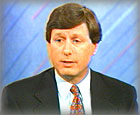 STEPHEN
CAMBONE, National Defense University: I don't think there were any real
accomplishments at this summit with respect to the major issue which
was the ABM Treaty. In fact, in certain respects it was a step backwards.
The President in a statement he made reference to has reaffirmed a cold-war
relationship with the Soviet Union -- now with Russia, that is to say,
based on mutual deterrence, and he has failed to find a formula for
moving us ahead to deploy the type of defenses we are going to need
while at the same time reducing offensive forces. STEPHEN
CAMBONE, National Defense University: I don't think there were any real
accomplishments at this summit with respect to the major issue which
was the ABM Treaty. In fact, in certain respects it was a step backwards.
The President in a statement he made reference to has reaffirmed a cold-war
relationship with the Soviet Union -- now with Russia, that is to say,
based on mutual deterrence, and he has failed to find a formula for
moving us ahead to deploy the type of defenses we are going to need
while at the same time reducing offensive forces.
RAY SUAREZ: Edward Lozansky, do you agree? No accomplishment?
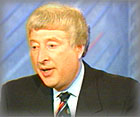 EDWARD
LOZANSKY, Consultant: No accomplishment. We hear empty rhetoric about EDWARD
LOZANSKY, Consultant: No accomplishment. We hear empty rhetoric about
how America wants Russia to be a democratic and free nation. So far
we didn't see any moves which actually can allow that. Russia indicated
several times that it wants to be a member of NATO. Now President Putin
says he wants to develop a joint missile defense. All those reproaches
were rebuffed by NATO and by President Clinton. So I don't see any accomplishments
at all.
RAY SUAREZ: Michael McFaul?
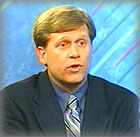 MICHAEL
McFAUL, Carnegie Endowment: Well, Ray, I think you have to invite us
back in ten years' time and ask us. I say that because whether this
is a success or not depends in large measure whether Russia does become
a democratic state and a market economy oriented towards Europe. If
it does, then we'll go back and we'll look at Clinton's speech to the
Duma and say this guy was really looking far into the future. He sees
that this is a precondition towards doing these other things. If ten
years from now Russia is a normal democratic state, arms control won't
be on the top of the agenda and we won't call meetings between Russians
and Americans summits. We'll call them working groups much like we do
with Great Britain or France. That will be a true test as to whether
this was a success or a failure. MICHAEL
McFAUL, Carnegie Endowment: Well, Ray, I think you have to invite us
back in ten years' time and ask us. I say that because whether this
is a success or not depends in large measure whether Russia does become
a democratic state and a market economy oriented towards Europe. If
it does, then we'll go back and we'll look at Clinton's speech to the
Duma and say this guy was really looking far into the future. He sees
that this is a precondition towards doing these other things. If ten
years from now Russia is a normal democratic state, arms control won't
be on the top of the agenda and we won't call meetings between Russians
and Americans summits. We'll call them working groups much like we do
with Great Britain or France. That will be a true test as to whether
this was a success or a failure.
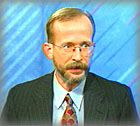 JOHN
PIKE, Federation of American Scientists: It was clearly a failure in
terms of the way the Clinton administration has defined its strategy
on dealing with Russia over the last several years. Basically the Clinton
national security team thought this was going to be a replay of the
March 1997 Helsinki summit where the Russians had complained about American
missile defense plans, complained about our plans to change the ABM
Treaty and then at the very last minute had gone along with the American
proposals. I thought that... I think they thought they were dealing
with the old Russia of Boris Yeltsin, really didn't understand that
they're dealing with a new Russia that's a lot more assertive than the
Russia they were dealing with in the last millennium. JOHN
PIKE, Federation of American Scientists: It was clearly a failure in
terms of the way the Clinton administration has defined its strategy
on dealing with Russia over the last several years. Basically the Clinton
national security team thought this was going to be a replay of the
March 1997 Helsinki summit where the Russians had complained about American
missile defense plans, complained about our plans to change the ABM
Treaty and then at the very last minute had gone along with the American
proposals. I thought that... I think they thought they were dealing
with the old Russia of Boris Yeltsin, really didn't understand that
they're dealing with a new Russia that's a lot more assertive than the
Russia they were dealing with in the last millennium.
MICHAEL McFAUL: I disagree. I don't know of anybody in the Clinton
administration who thought they were going to go sign a deal on national
missile defense in this meeting. This is the beginning of a long conversation,
both in this country and with the Russians, about this. I think it's
very good news that they didn't quite frankly because we haven't had
a debate about this here.  How
can we negotiate something with the Russians? And with regards to joint
programs which, in principle I'm in favor of, but only if Russia is
a friendly nation to the United States. Right now they're somewhere
in-between. You've heard it in the rhetoric. An enemy or an ally, they're
somewhere in-between - it's uncertain - there was real uncertainty in
the way that Clinton talked about Russia's future. Until we know that
we can't sign a deal to do it jointly and until we decide what we want
to do about national missile defense, it's premature to talk with the
Russians about it. How
can we negotiate something with the Russians? And with regards to joint
programs which, in principle I'm in favor of, but only if Russia is
a friendly nation to the United States. Right now they're somewhere
in-between. You've heard it in the rhetoric. An enemy or an ally, they're
somewhere in-between - it's uncertain - there was real uncertainty in
the way that Clinton talked about Russia's future. Until we know that
we can't sign a deal to do it jointly and until we decide what we want
to do about national missile defense, it's premature to talk with the
Russians about it.
RAY SUAREZ: Edward Lozansky, I'm interested in your idea that not much
happened when the president the of Russia seems to have moved from absolutely
no to well maybe we can talk about it when it comes to a missile defense
system.
|
|
| Russia
and the U.S. missile defense system |
|
EDWARD LOZANSKY: Not just talk about it. I can see it - this is more
than we can expect. He offered the United States to have joint missile
defense and this is what we are indicating now for three years and finally
president of Russia accepted and America rebuffed and doesn't even want
to mention it. Senator McCain mentioned yesterday on Meet the Press
mentioned that Russians have nothing to contribute to missile defense;
this is not true. Russian can't contribute money; they don't have money,
but they have great brains and science and with American capital and
Russian brains I think this system can be much better than America on
its own.
RAY SUAREZ: But let's go further on missile talks. There seems to be
wiggle room as the Clinton team leaves Moscow, more than there would
have been two or three months ago.
 STEPHEN
CAMBONE: I don't think so. I think - in fact -- quite the opposite.
Yes, it is true that Mr. Putin has talked about a cooperative effort,
but all the signs are that it is for a much less capable system called
theater missile defense, and it is a notion, if I dare say so, that
was on the table in 1992, when the Clinton administration came into
office, and so it's interesting that Michael would say that the Russians
are now somewhere between being partner and an adversary when the administration
came to office, we were well on the path to having them as partners.
We leave with the administration locked into an impossible negotiation
with them in treating them as adversaries. This is an odd turn of events.
For the Russians now they're in a very difficult position. They make
an offer like this for the purposes of constraining what they think
we are going to do without, in fact, any leverage over this process,
because they know in the end that both Vice President Gore and Governor
Bush have said that they are going to go forward with this missile defense
system. STEPHEN
CAMBONE: I don't think so. I think - in fact -- quite the opposite.
Yes, it is true that Mr. Putin has talked about a cooperative effort,
but all the signs are that it is for a much less capable system called
theater missile defense, and it is a notion, if I dare say so, that
was on the table in 1992, when the Clinton administration came into
office, and so it's interesting that Michael would say that the Russians
are now somewhere between being partner and an adversary when the administration
came to office, we were well on the path to having them as partners.
We leave with the administration locked into an impossible negotiation
with them in treating them as adversaries. This is an odd turn of events.
For the Russians now they're in a very difficult position. They make
an offer like this for the purposes of constraining what they think
we are going to do without, in fact, any leverage over this process,
because they know in the end that both Vice President Gore and Governor
Bush have said that they are going to go forward with this missile defense
system.
RAY SUAREZ: But why is that considered adversarial when every official
pronouncement from American appointees or officeholders is this system
isn't about you, it's about smaller states that may try to -
 JOHN
PIKE: One thing is that basically the Russians aren't getting any respect;
we're going to them and telling them what is going to happen. We're
basically dictating to them and they don't like that simply as -- an
attitude towards an awful lot of about arms control is negotiating,
sort of mutual respect - that's been absent in the negotiations. The
Russians are also concerned that if we basically immunize ourselves
from smaller states like Iraq or North Korea, that we might be predisposed
to embark on military adventures, and that's going to upset the global
balance of power. They're also concerned that it seems we come back
to the table every couple of years to chip away at the ABM Treaty, and
maybe the systems we're talking about today don't bother them, wouldn't
undermine their deterrent but you don't have to go too far down the
road and look 10 or 15 years in the future and basically see a situation
in which we've immunized ourselves from everyone else's nuclear force,
why don't we do it to the Russians as well? JOHN
PIKE: One thing is that basically the Russians aren't getting any respect;
we're going to them and telling them what is going to happen. We're
basically dictating to them and they don't like that simply as -- an
attitude towards an awful lot of about arms control is negotiating,
sort of mutual respect - that's been absent in the negotiations. The
Russians are also concerned that if we basically immunize ourselves
from smaller states like Iraq or North Korea, that we might be predisposed
to embark on military adventures, and that's going to upset the global
balance of power. They're also concerned that it seems we come back
to the table every couple of years to chip away at the ABM Treaty, and
maybe the systems we're talking about today don't bother them, wouldn't
undermine their deterrent but you don't have to go too far down the
road and look 10 or 15 years in the future and basically see a situation
in which we've immunized ourselves from everyone else's nuclear force,
why don't we do it to the Russians as well?
MICHAEL McFAUL: And precisely the 10 to 15 years part of that comment
is what I meant when I said we'll have to wait ten to years to 15 years
because in ten to fifteen years Russia has integrated into the European
Union-and let me note one other thing: Clinton in Germany changed the
policy by saying we want to leave the door open for both NATO and the
European Union. That has never been said before by the American President.
If 10 to 15 years down the road Russia has no intention to get into
a nuclear contest with the United States, then it really won't matter.
That, to me, is the key part about Russia's future and U.S.-Russian
relations, not whether we have an agreement today on national missile
defense.
|
|
| Democracy
in Russia |
|
 EDWARD
LOZANSKY: Well the reason I think Michael is talking about Russia failed
as a democracy, I think to some extent America is at fault. Because
in 91-92 Russia was open to America and wanted to be a strategic partner
and America didn't deliver. We didn't back it up with money. All this
American aid is laughable. We spent it later, when we bombed Kosovo.
Now we're going to do missile defense results Russia asking to join.
So I think that almost on every point on Russian democracy, I agree
with Michael. EDWARD
LOZANSKY: Well the reason I think Michael is talking about Russia failed
as a democracy, I think to some extent America is at fault. Because
in 91-92 Russia was open to America and wanted to be a strategic partner
and America didn't deliver. We didn't back it up with money. All this
American aid is laughable. We spent it later, when we bombed Kosovo.
Now we're going to do missile defense results Russia asking to join.
So I think that almost on every point on Russian democracy, I agree
with Michael.
MICHAEL McFAUL: Russian democracy hasn't failed yet. The failure is
the Russians have failed to create democracy in Russia.
EDWARD LOZANSKY: But America was Professor, Russia as student. America
was professor. When the student fails it's also the fault of the professor.
I know this because I teach a course. If my students fail, it's also
my fault.
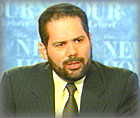 RAY
SUAREZ: Wait, I'm interested in this tone of pessimism because here
we had an American president flying to Moscow to meet a popularly elected
47-year-old up through the party ranks to high office guy. A new Russia.
Why are you guys so down on what seems to be a real crystallization? RAY
SUAREZ: Wait, I'm interested in this tone of pessimism because here
we had an American president flying to Moscow to meet a popularly elected
47-year-old up through the party ranks to high office guy. A new Russia.
Why are you guys so down on what seems to be a real crystallization?
EDWARD LOZANSKY: We're not down, we're waiting for new people in the
White House because this administration failed. So we're waiting for
new people. That's the great thing about democracy, so you can expect
new people.
JOHN PIKE: One thing that has changed in the case of the Russians is
that we're not dealing with the Yeltsin administration, that we're dealing
evidently with a Clinton administration that is bent on restoring some
degree of dignity and respect for Russia. The bottom line is over the
last ten years, the American government, the American political system,
has treated Russia as the sick man of Europe who has fallen and can't
get up. It basically may complain about things but at the end of the
day is going to do exactly what they're told. Now it is not normal for
a large, great country to act that way. I think what we're seeing is
the reassertion of Russia as a normal state that is able to define its
interests and act according to those interests. The Clinton administration,
I think, had a strategy that assumed that at the end of the day the
Russians would do what they were told, the way the Yeltsin administration
did on previous ABM arms control negotiations. I think that we have
to deal with the fact that this is a new Russia, a new leadership and
they're starting to act like a normal country that isn't always going
to do what they're told.
|
|
| |
Russia's
relationship with the next U.S. president |
| |
RAY SUAREZ: But isn't it also a country with real deep-seated troubles
when it comes to things like protecting its stock pile, monitoring its
weapons, patrolling its own air space, regulating its economy?
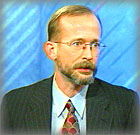 JOHN
PIKE: That's why these small agreements are important. Because it's
evidently concerned that we want to keep Russian plutonium in Russia
and out of Iran. I would have been a lot happier if they had implemented
this agreement two years ago when they originally signed it. The thing
was basically put on hold for two years because of kazoo. I would be
a lot happier if it was the 50 tons they agreed to originally rather
than the 34 tons now. I'd be a lot happier if it was the rest of the plutonium. There are a lot of things that they could have done two years
ago that they should have done now that I hope they are going to do
in the future. I would not underestimate how important it is. JOHN
PIKE: That's why these small agreements are important. Because it's
evidently concerned that we want to keep Russian plutonium in Russia
and out of Iran. I would have been a lot happier if they had implemented
this agreement two years ago when they originally signed it. The thing
was basically put on hold for two years because of kazoo. I would be
a lot happier if it was the 50 tons they agreed to originally rather
than the 34 tons now. I'd be a lot happier if it was the rest of the plutonium. There are a lot of things that they could have done two years
ago that they should have done now that I hope they are going to do
in the future. I would not underestimate how important it is.
RAY SUAREZ: So is the table set for the next President, Stephen Cambone?
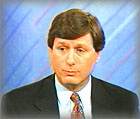 STEPHEN
CAMBONE: I think it probably is. I'm doubtful that we can get from where
we are to any kind of an agreement that would bee satisfactory to the
two sides. On the issue of teaching, it is important to think about
what we are teaching by the big agreements we're proposing, because
by sticking to the ABM Treaty, by sticking to the concept of offensive
deterrence as the basis of the strategic relationship between us, what
we are teaching our new partners is that we expect a certain kind of
relationship with them. And the administration has not broken that mold.
It consistently pushes that line off argument. I think they may end
up reaping what they sow. Consequently we have to wait for a new administration,
it's either going to be the Gore or the Bush administration which is
going to have to make a clean break if they hope to get the kind of
missile defense we'd like to have and the kind of relationship we want
with the Russians. STEPHEN
CAMBONE: I think it probably is. I'm doubtful that we can get from where
we are to any kind of an agreement that would bee satisfactory to the
two sides. On the issue of teaching, it is important to think about
what we are teaching by the big agreements we're proposing, because
by sticking to the ABM Treaty, by sticking to the concept of offensive
deterrence as the basis of the strategic relationship between us, what
we are teaching our new partners is that we expect a certain kind of
relationship with them. And the administration has not broken that mold.
It consistently pushes that line off argument. I think they may end
up reaping what they sow. Consequently we have to wait for a new administration,
it's either going to be the Gore or the Bush administration which is
going to have to make a clean break if they hope to get the kind of
missile defense we'd like to have and the kind of relationship we want
with the Russians.
RAY SUAREZ: President Putin said he's ready to work with both of them.
EDWARD LOZANSKY: The new president has to decide do we want Russia
as a strategic partner or not? So far we only hear empty words, rhetoric.
If America wants Russia as a strategic partner, it can be achieved.
My information or my sources I go to Moscow all the time, Russia is
ready to become America's strategic partner. America is not ready to
accept Russia as such. When America is ready, then this can dramatically
change.
RAY SUAREZ: Quick comment, Michael McFaul.
 MICHAEL
McFAUL: For that to happen Russia has to act like a strategic partner
- has to act like a democracy that is integrated into Europe. That is
the key in U.S.-Russian relations. Right now they're indifferent to
democracy. Mr. Putin is indifferent. Whether they go forward or backward
will dictate- what kind of relationship we have in the next decade. MICHAEL
McFAUL: For that to happen Russia has to act like a strategic partner
- has to act like a democracy that is integrated into Europe. That is
the key in U.S.-Russian relations. Right now they're indifferent to
democracy. Mr. Putin is indifferent. Whether they go forward or backward
will dictate- what kind of relationship we have in the next decade.
RAY SUAREZ: Gentlemen, thanks a lot.
|
Copyright © 2000 MacNeil-Lehrer Productions.
All Rights Reserved.
 STEPHEN
CAMBONE, National Defense University: I don't think there were any real
accomplishments at this summit with respect to the major issue which
was the ABM Treaty. In fact, in certain respects it was a step backwards.
The President in a statement he made reference to has reaffirmed a cold-war
relationship with the Soviet Union -- now with Russia, that is to say,
based on mutual deterrence, and he has failed to find a formula for
moving us ahead to deploy the type of defenses we are going to need
while at the same time reducing offensive forces.
STEPHEN
CAMBONE, National Defense University: I don't think there were any real
accomplishments at this summit with respect to the major issue which
was the ABM Treaty. In fact, in certain respects it was a step backwards.
The President in a statement he made reference to has reaffirmed a cold-war
relationship with the Soviet Union -- now with Russia, that is to say,
based on mutual deterrence, and he has failed to find a formula for
moving us ahead to deploy the type of defenses we are going to need
while at the same time reducing offensive forces.  EDWARD
LOZANSKY, Consultant: No accomplishment. We hear empty rhetoric about
EDWARD
LOZANSKY, Consultant: No accomplishment. We hear empty rhetoric about
 MICHAEL
McFAUL, Carnegie Endowment: Well, Ray, I think you have to invite us
back in ten years' time and ask us. I say that because whether this
is a success or not depends in large measure whether Russia does become
a democratic state and a market economy oriented towards Europe. If
it does, then we'll go back and we'll look at Clinton's speech to the
Duma and say this guy was really looking far into the future. He sees
that this is a precondition towards doing these other things. If ten
years from now Russia is a normal democratic state, arms control won't
be on the top of the agenda and we won't call meetings between Russians
and Americans summits. We'll call them working groups much like we do
with Great Britain or France. That will be a true test as to whether
this was a success or a failure.
MICHAEL
McFAUL, Carnegie Endowment: Well, Ray, I think you have to invite us
back in ten years' time and ask us. I say that because whether this
is a success or not depends in large measure whether Russia does become
a democratic state and a market economy oriented towards Europe. If
it does, then we'll go back and we'll look at Clinton's speech to the
Duma and say this guy was really looking far into the future. He sees
that this is a precondition towards doing these other things. If ten
years from now Russia is a normal democratic state, arms control won't
be on the top of the agenda and we won't call meetings between Russians
and Americans summits. We'll call them working groups much like we do
with Great Britain or France. That will be a true test as to whether
this was a success or a failure.  JOHN
PIKE, Federation of American Scientists: It was clearly a failure in
terms of the way the Clinton administration has defined its strategy
on dealing with Russia over the last several years. Basically the Clinton
national security team thought this was going to be a replay of the
March 1997 Helsinki summit where the Russians had complained about American
missile defense plans, complained about our plans to change the ABM
Treaty and then at the very last minute had gone along with the American
proposals. I thought that... I think they thought they were dealing
with the old Russia of Boris Yeltsin, really didn't understand that
they're dealing with a new Russia that's a lot more assertive than the
Russia they were dealing with in the last millennium.
JOHN
PIKE, Federation of American Scientists: It was clearly a failure in
terms of the way the Clinton administration has defined its strategy
on dealing with Russia over the last several years. Basically the Clinton
national security team thought this was going to be a replay of the
March 1997 Helsinki summit where the Russians had complained about American
missile defense plans, complained about our plans to change the ABM
Treaty and then at the very last minute had gone along with the American
proposals. I thought that... I think they thought they were dealing
with the old Russia of Boris Yeltsin, really didn't understand that
they're dealing with a new Russia that's a lot more assertive than the
Russia they were dealing with in the last millennium.  How
can we negotiate something with the Russians? And with regards to joint
programs which, in principle I'm in favor of, but only if Russia is
a friendly nation to the United States. Right now they're somewhere
in-between. You've heard it in the rhetoric. An enemy or an ally, they're
somewhere in-between - it's uncertain - there was real uncertainty in
the way that Clinton talked about Russia's future. Until we know that
we can't sign a deal to do it jointly and until we decide what we want
to do about national missile defense, it's premature to talk with the
Russians about it.
How
can we negotiate something with the Russians? And with regards to joint
programs which, in principle I'm in favor of, but only if Russia is
a friendly nation to the United States. Right now they're somewhere
in-between. You've heard it in the rhetoric. An enemy or an ally, they're
somewhere in-between - it's uncertain - there was real uncertainty in
the way that Clinton talked about Russia's future. Until we know that
we can't sign a deal to do it jointly and until we decide what we want
to do about national missile defense, it's premature to talk with the
Russians about it. 
 RAY
SUAREZ: Wait, I'm interested in this tone of pessimism because here
we had an American president flying to Moscow to meet a popularly elected
47-year-old up through the party ranks to high office guy. A new Russia.
Why are you guys so down on what seems to be a real crystallization?
RAY
SUAREZ: Wait, I'm interested in this tone of pessimism because here
we had an American president flying to Moscow to meet a popularly elected
47-year-old up through the party ranks to high office guy. A new Russia.
Why are you guys so down on what seems to be a real crystallization? JOHN
PIKE: That's why these small agreements are important. Because it's
evidently concerned that we want to keep Russian plutonium in Russia
and out of Iran. I would have been a lot happier if they had implemented
this agreement two years ago when they originally signed it. The thing
was basically put on hold for two years because of kazoo. I would be
a lot happier if it was the 50 tons they agreed to originally rather
than the 34 tons now. I'd be a lot happier if it was the rest of the plutonium. There are a lot of things that they could have done two years
ago that they should have done now that I hope they are going to do
in the future. I would not underestimate how important it is.
JOHN
PIKE: That's why these small agreements are important. Because it's
evidently concerned that we want to keep Russian plutonium in Russia
and out of Iran. I would have been a lot happier if they had implemented
this agreement two years ago when they originally signed it. The thing
was basically put on hold for two years because of kazoo. I would be
a lot happier if it was the 50 tons they agreed to originally rather
than the 34 tons now. I'd be a lot happier if it was the rest of the plutonium. There are a lot of things that they could have done two years
ago that they should have done now that I hope they are going to do
in the future. I would not underestimate how important it is. STEPHEN
CAMBONE: I think it probably is. I'm doubtful that we can get from where
we are to any kind of an agreement that would bee satisfactory to the
two sides. On the issue of teaching, it is important to think about
what we are teaching by the big agreements we're proposing, because
by sticking to the ABM Treaty, by sticking to the concept of offensive
deterrence as the basis of the strategic relationship between us, what
we are teaching our new partners is that we expect a certain kind of
relationship with them. And the administration has not broken that mold.
It consistently pushes that line off argument. I think they may end
up reaping what they sow. Consequently we have to wait for a new administration,
it's either going to be the Gore or the Bush administration which is
going to have to make a clean break if they hope to get the kind of
missile defense we'd like to have and the kind of relationship we want
with the Russians.
STEPHEN
CAMBONE: I think it probably is. I'm doubtful that we can get from where
we are to any kind of an agreement that would bee satisfactory to the
two sides. On the issue of teaching, it is important to think about
what we are teaching by the big agreements we're proposing, because
by sticking to the ABM Treaty, by sticking to the concept of offensive
deterrence as the basis of the strategic relationship between us, what
we are teaching our new partners is that we expect a certain kind of
relationship with them. And the administration has not broken that mold.
It consistently pushes that line off argument. I think they may end
up reaping what they sow. Consequently we have to wait for a new administration,
it's either going to be the Gore or the Bush administration which is
going to have to make a clean break if they hope to get the kind of
missile defense we'd like to have and the kind of relationship we want
with the Russians.